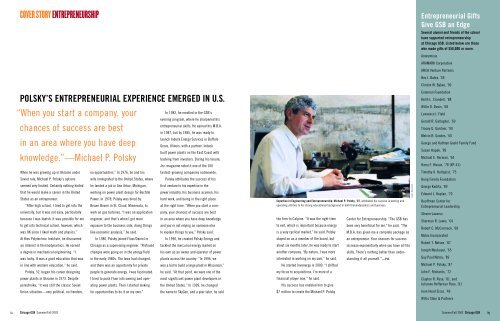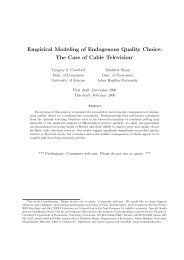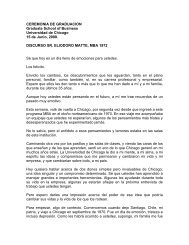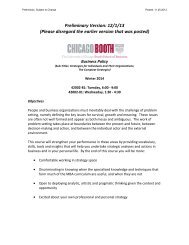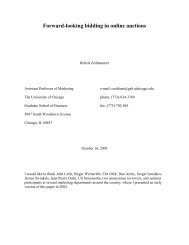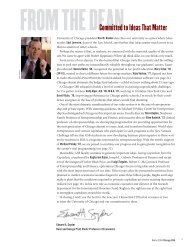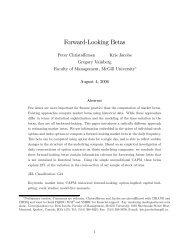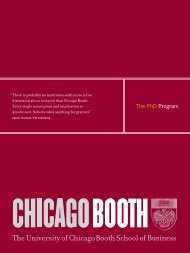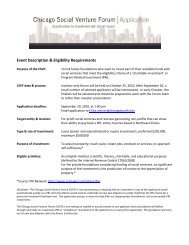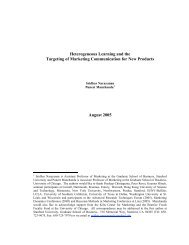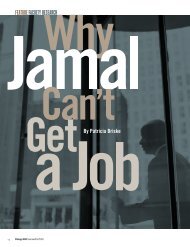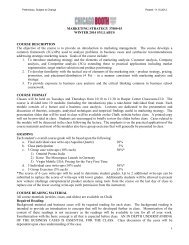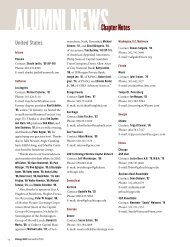How VCs Choose Entrepreneurs - The University of Chicago Booth ...
How VCs Choose Entrepreneurs - The University of Chicago Booth ...
How VCs Choose Entrepreneurs - The University of Chicago Booth ...
You also want an ePaper? Increase the reach of your titles
YUMPU automatically turns print PDFs into web optimized ePapers that Google loves.
COVER STORY ENTREPRENEURSHIP<br />
Entrepreneurial Gifts<br />
Give GSB an Edge<br />
Several alumni and friends <strong>of</strong> the school<br />
have supported entrepreneurship<br />
at <strong>Chicago</strong> GSB. Listed below are those<br />
who made gifts <strong>of</strong> $50,000 or more.<br />
Anonymous<br />
ARAMARK Corporation<br />
ARCH Venture Partners<br />
Rex J. Bates, ’49<br />
Clinton W. Bybee, ’90<br />
POLSKY’S ENTREPRENEURIAL EXPERIENCE EMERGED IN U.S.<br />
Coleman Foundation<br />
Keith L. Crandell, ’88<br />
“When you start a company, your<br />
chances <strong>of</strong> success are best<br />
in an area where you have deep<br />
knowledge.”—Michael P. Polsky<br />
In 1982, he enrolled in the GSB’s<br />
evening program, where he sharpened his<br />
entrepreneurial skills. He earned his M.B.A.<br />
in 1987, but by 1985, he was ready to<br />
launch Indeck Energy Services in Buffalo<br />
Grove, Illinois, with a partner. Indeck<br />
built power plants on the East Coast with<br />
backing from investors. During his tenure,<br />
Inc. magazine rated it one <strong>of</strong> the 100<br />
Willie D. Davis, ’68<br />
Lawrence I. Field<br />
Gerald R. Gallagher, ’69<br />
Tracey G. Gardner, ’90<br />
Melvin R. Goodes, ’60<br />
George and Kathryn Gould Family Fund<br />
Susan Hapak, ’89<br />
Michael E. Herman, ’64<br />
Harry F. Hixson, ’78 (XP-41)<br />
When he was growing up in Ukraine under<br />
no opportunities.” In 1976, he and his<br />
fastest-growing companies nationwide.<br />
Timothy A. Hultquist, ’75<br />
Soviet rule, Michael P. Polsky’s options<br />
wife immigrated to the United States, where<br />
Polsky attributes the success <strong>of</strong> his<br />
Hung Family Foundation<br />
seemed very limited. Certainly nothing hinted<br />
that he would make a career in the United<br />
States as an entrepreneur.<br />
“After high school, I tried to get into the<br />
university, but it was not easy, particularly<br />
because I was Jewish. It was possible for me<br />
to get into technical school, however, which<br />
was OK since I liked math and physics.”<br />
At Kiev Polytechnic Institute, he discovered<br />
an interest in thermodynamics. He earned<br />
a degree in mechanical engineering. “I<br />
was lucky. It was a good education that was<br />
in line with western education,” he said.<br />
he landed a job in Ann Arbor, Michigan,<br />
working on power plant design for Bechtel<br />
Power. In 1978, Polsky was hired by<br />
Brown Boveri in St. Cloud, Minnesota, to<br />
work on gas turbines. “I was an application<br />
engineer, and that’s when I got more<br />
exposure to the business side, doing things<br />
like economic analysis,” he said.<br />
In 1980, Polsky joined Fluor/Daniel in<br />
<strong>Chicago</strong> as a supervising engineer. “Pr<strong>of</strong>ound<br />
changes were going on in the energy field<br />
in the early 1980s. <strong>The</strong> laws had changed,<br />
and there was an opportunity for private<br />
first venture to his expertise in the<br />
power industry, his business acumen, his<br />
hard work, and being in the right place<br />
at the right time. “When you start a company,<br />
your chances <strong>of</strong> success are best<br />
in an area where you have deep knowledge<br />
and you’re not relying on someone else<br />
to explain things to you,” Polsky said.<br />
In 1990, he created Polsky Energy and<br />
tackled the mercurial energy market on<br />
his own as an owner and operator <strong>of</strong> power<br />
plants across the country. “In 1996, we<br />
won a bid to build a large plant in Wisconsin,”<br />
Expertise in Engineering and <strong>Entrepreneurs</strong>hip: Michael P. Polsky, ’87, attributed his success in owning and<br />
operating utilities to his strong educational background in both thermodynamics and business.<br />
the firm to Calpine. “It was the right time<br />
to exit, which is important because energy<br />
is a very cyclical market,” he said. Polsky<br />
stayed on as a member <strong>of</strong> the board, but<br />
about six months later, he was ready to start<br />
another company. “By nature, I was more<br />
interested in working on my own,” he said.<br />
He started Invenergy in 2000. “I shifted<br />
Center for <strong>Entrepreneurs</strong>hip. “<strong>The</strong> GSB has<br />
been very beneficial for me,” he said. “<strong>The</strong><br />
M.B.A. has given me a complete package as<br />
an entrepreneur. Your chances for success<br />
increase exponentially when you have all the<br />
skills. <strong>The</strong>re’s nothing better than understanding<br />
it all yourself.”—P.B.<br />
Kevin Weinstein<br />
George Kadifa, ’89<br />
Edward L. Kaplan, ’70<br />
Kauffman Center for<br />
Entrepreneurial Leadership<br />
Steven Lazarus<br />
Sherman R. Lewis, ’64<br />
Robert C. McCormack, ’68<br />
Molex Incorporated<br />
Robert T. Nelsen, ’87<br />
Joseph Neubauer, ’65<br />
Guy Paul Nohra, ’89<br />
Michael P. Polsky, ’87<br />
Polsky, 52, began his career designing<br />
people to generate energy. I was fascinated.<br />
he said. “At that point, we were one <strong>of</strong> the<br />
my focus to acquisitions. I’m more <strong>of</strong> a<br />
John F. Richards, ’72<br />
power plants in Ukraine in 1973. Despite<br />
perestroika, “it was still the classic Soviet<br />
I tried to push Fluor into owning and operating<br />
power plants. <strong>The</strong>n I started looking<br />
most significant power plant developers in<br />
the United States.” In 1999, he changed<br />
financial player now,” he said.<br />
His success has enabled him to give<br />
Clayton R. Rose, ’81, and<br />
Julianne Heffernan Rose, ’81<br />
Union situation—very political, no freedom,<br />
for opportunities to do it on my own.”<br />
the name to SkyGen, and a year later, he sold<br />
$7 million to create the Michael P. Polsky<br />
Jean Head Sisco, ’46<br />
Willis Stein & Partners<br />
36 <strong>Chicago</strong> GSB Summer/Fall 2002<br />
Summer/Fall 2002 <strong>Chicago</strong> GSB 37


